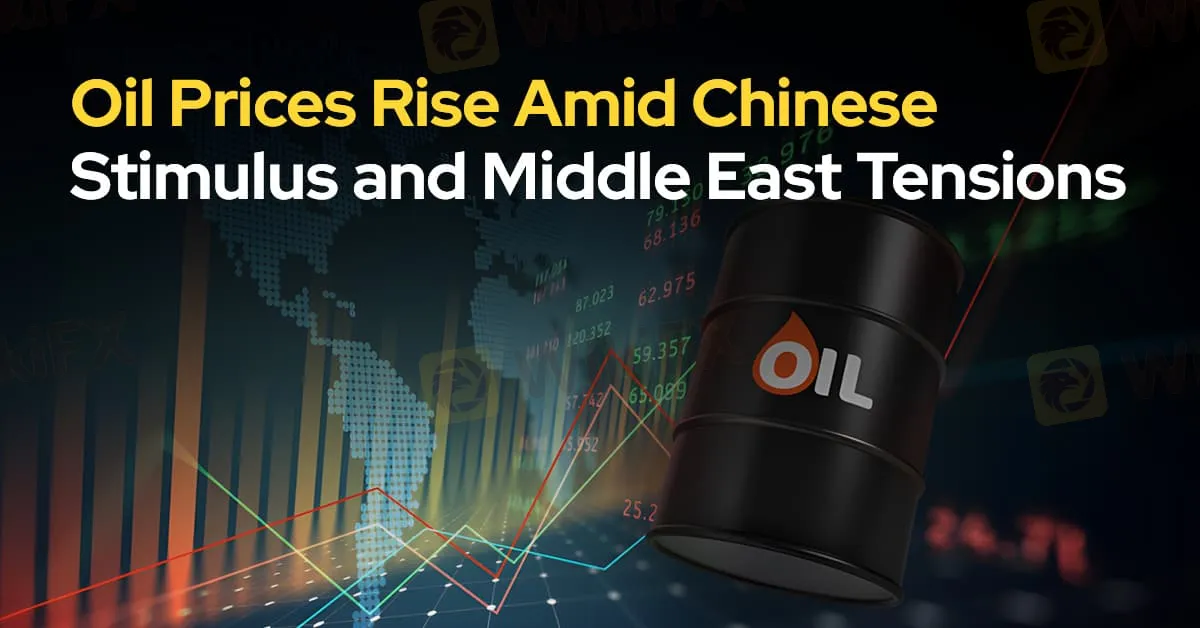简体中文
繁體中文
English
Pусский
日本語
ภาษาไทย
Tiếng Việt
Bahasa Indonesia
Español
हिन्दी
Filippiiniläinen
Français
Deutsch
Português
Türkçe
한국어
العربية
Oil Prices Rise Amid Chinese Stimulus and Middle East Tensions
Abstract:According to report, oil prices experienced a notable increase this week, with Brent crude climbing above $74 a barrel after a period of volatility.

Oil prices experienced a notable increase this week, with Brent crude climbing above $74 a barrel after a period of volatility. This rise follows a series of aggressive economic measures introduced by Chinese authorities, aimed at revitalizing the nations slowing economy. Meanwhile, escalating tensions in the Middle East, particularly involving Israel and Hezbollah, have contributed to the market's volatility.
After dipping by 0.8% on Monday, West Texas Intermediate was trading close to $71. The boost in prices can be attributed to recent announcements from Pan Gongsheng, the governor of the People's Bank of China, who outlined a comprehensive strategy to achieve the country's growth target of around 5% for the year. Key initiatives include enhanced lending capabilities for financial institutions and a reduction in the central bank's short-term interest rates, which are expected to stimulate both economic growth and energy demand in the worlds largest oil consumer.
According to Han Zhong Liang, an investment strategist at Standard Chartered Plc in Singapore, “These measures could positively impact China's demand for oil. The real challenge will be how effectively these lower rates translate into real economic activity.”
Conversely, the oil market is grappling with concerns about a faltering Chinese economy and the potential for increased supply from OPEC+, which has resulted in a 14% decline in prices over the past quarter.
In parallel, the geopolitical landscape has become increasingly tense as Israel launched a series of strikes against Hezbollah positions in southern Lebanon, leading to approximately 500 fatalities—marking the deadliest day of conflict since the 2006 war. Although Iran, a key ally of Hezbollah, has expressed a desire to de-escalate, the situation remains volatile.
As the market reacts to these dual pressures from economic policy and geopolitical tensions, the direction of oil prices will heavily depend on developments in China and the stability of the Middle East shortly.

Disclaimer:
The views in this article only represent the author's personal views, and do not constitute investment advice on this platform. This platform does not guarantee the accuracy, completeness and timeliness of the information in the article, and will not be liable for any loss caused by the use of or reliance on the information in the article.
Read more

Fake FX Investment Scheme Cost Malaysians RM3.9 Million
38 Malaysian investors have come forward alleging they were deceived by a fraudulent foreign exchange (forex) investment scheme, resulting in collective losses exceeding RM3.9 million.

Is Your Money Safe with Libra Markets? Check Out Fast!
n this exposure episode, we will take you through the heinous game played by Libra Markets, an unregulated forex broker. Take a look at how people are facing issues regarding withdrawals.

TradeHall vs. HYCM: Which Broker Should You Choose?
When choosing a broker, understanding the difference between superficial features and real regulatory protection is essential. In this article, WikiFX will compare TradeHall and HYCM. While on the surface, both brokers offer a wide range of trading instruments, the real difference lies in their regulatory statuses, which is a commonly overlooked factor for traders when they opt for brokers.

Trade Nation vs. FBS: Which Broker Is Better for New Traders?
If you're new to trading, choosing the right broker can feel overwhelming. Two popular choices, Trade Nation and FBS, offer very different experiences. This comparison breaks down which is better suited for beginners, based on ease of use, safety, costs, and support.
WikiFX Broker
Latest News
OneRoyal Expands to Oman, Strengthening Forex Trading in MENA
Govt Imposes Import Curbs on Precious Metal to Stop Liquid Gold Inflow
Reviewing CFreserve - Regulation Status, Operation Period & More
Starlink rival Eutelsat pops 22% as France backs capital raise
The Fed held interest rates steady, but some credit card APRs keep going up. Here's why
Meta, EssilorLuxottica unveil Oakley smart glasses
Important Statement on the Authenticity of WikiFX Score and Broker Reviews
JPMorgan to Launch JPMD Deposit Token
Kroger's shares rise as grocer says shoppers seek lower prices, cook more at home
Circle shares extend their rally after Senate passes landmark stablecoin bill
Currency Calculator


